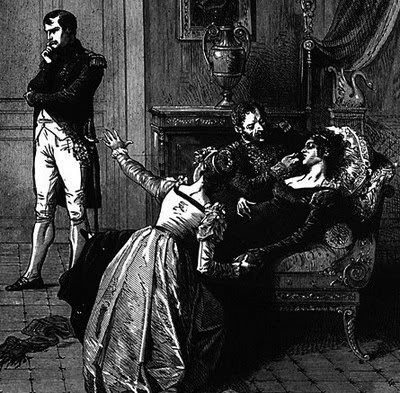
Today is Rare Disease Day, an international day of awareness-raising activities under the slogan “Join Together for Better Care”. Yesterday, the House of Commons held a debate on the effects of welfare cuts on the sick and disabled. As you can see, it was teeming with people who care.
While the debate dribbled on, I read a discussion on one of the Marfan Syndrome social forums. A man was expecting the birth of his son, and wanted to know how he could bring the boy up to see Marfans in a positive – or at least neutral – light. A Marf parent has a 50% chance of passing the mutated gene onto their child. If his son isn’t born with the syndrome, he will still experience the fallout of strangers’ reactions to his father. Which, let me tell you from experience, will not be the stuff gleaming Liberal utopian dreams are made on.
This had me thinking. If I could go back in time to offer my child-self advice on living with disability, what would I say?
Anyone with a rare disease or disorder will be well-acquainted with the word ‘awkward’. It usually arrives wearing a friendly mask: mild teasing when you explain you can’t help your colleague move their heavy desk, or the tutting of your fellow Girl Guides when you faint on the way to the world’s oldest toy shop and have to lie panting on the Oxford Circus floor tiles, watching commuters’ feet hurrying by.
“Hamleys is going to close soon,” someone whined in my ear. “Just stand up.”
Disability is just as much a social challenge as it is physical. You learn you are not simply inconveniencing people – you are the inconvenience.
I grew up before the Internet was permanently glued to the palms of our hands. When I eventually got a modem and an hour each weekend to play on it, it didn’t occur to me to look for advocacy groups, support services, or other people like me. My fear was that I would type ‘Marfans’ into the search field and find nothing but derision and cluelessness, as I had in real life. “If it was really that bad,” my PE teacher said when I tried to explain that trampoline + weak connective tissue = disaster, “I would have heard of it”. Then she made me get on the damn trampoline.
13-year-old Verity internalised the message that disability equals inferiority.
It took me years to gather the courage to seek out other Marfs online. When I did, I realised how valuable support groups are for those of us with rare disorders, and not merely in a fluffy, join-hands-and-sway-to-the-folk-guitar way.
“If you ever get a fuzzy black curtain descending over one side of your vision, drop what you’re doing and run to A&E – your retinas are detaching “ Good to know, yes? Or: “Get a medical alert bracelet. If you’re on the floor with a collapsed lung, you won’t be able to talk.”
Nobody had told me. I was so used to explaining the little I knew about my condition to my own doctors, to being the star attraction for medical students, to fielding gigantic questions from people in power such as the DWP employee who asked, “So, can you just, like, explain to me what this thing is?“. I had been trained to believe that even if quietly soldiering on put me in danger, at least it meant I wasn’t getting in anyone’s way.
The social model of disability says that disability is caused by the way society is organised, rather than by a person’s impairment or difference. When barriers are removed, disabled people can be independent and equal in society, with choice and control over their own lives. – Scope.
Able-bodied or otherwise, we are brought up knowing the archetypes: The Inspiring Cripple, The Grateful Invalid. Strivers and Skivers. The poisonous leftovers of the Victorian Deserving/Undeserving dichotomy. I have said before that to discuss these issues one has to cloak oneself in charm and detachment, because if there’s anything those in favour of welfare cuts can’t stand, it’s the bolshie sick. Perhaps it reminds them of the uncomfortable old adage that a society is only as civilised as its treatment of the vulnerable.
In the UK, it’s a lousy time to be disabled. Vital services are being cut back, benefits are taken away, and women in comas are told they are fit for work. Quota systems deliberately work against us, disturbing documents are leaked, fees stand in the way of employment tribunals, and only a handful of MPs grudgingly turn up to welfare debates. You feel ashamed to seek help; you come to expect disdain. The social model of disability thrives on the active disempowerment of those already at a disadvantage. Watch it at work.
So, on Rare Disease Day, when I like to take stock of my network of support, and the possibilities of the future, I find myself looking at my country and not feeling terribly wanted. Nevertheless, I still have sufficient self-esteem to know that if I could go back and tell my child-self anything, it would be that disability does not equal inferiority. It doesn’t, despite the strenuous efforts of those more fortunate than you: people who may be elected officials, or wearing ATOS lanyards, or just little girls impatient to get to the toy shop before it closes.


Well said, Verity! A friend of my daughter’s has brittle asthma which is reasonably well understood, if hard to manage. One of her triggers is cold weather and exercise. Did this matter to the PE staff at the well regarded local school they both went to? Did it buffalo! She was made to go on cross country runs despite this, even though she had to use her asthma inhaler every few paces. If the staff could get away with such a cavalier attitude to asthma, it does not surprise me that they treated you so badly. It is past time that everyone rethought their attitudes to ill health. One day they too will be old and unwell.
I have serious problems with math. Having a learning disability made it hard from the start, but now I have to be very careful or I’ll have anxiety attacks, engage in SIBs, and be unable to complete my assignments.
I am 23 years old and still being forced to take a math class as part of my college curriculum. Years of failure and punishment have left me with no interest in math beyond hating and fearing it. I know math is important to the country’s workforce, but not everyone does well at it. I wish people would stop trying to shove me into that group.
PE is a problem, isn’t it? It must be hard to have a group of 30 kids and devise activities they can all do. But then so many of them just don’t care or try. I remember being about 6 and being sent to a corner to walk up and down a line on the floor while the teacher concentrated on everyone else – which is still better than being forced to jump on the trampoline!
Hey V, I remember you from LCH and found a link and here you are! I wanted to say hello and hope that all is well with you. 🙂
Hello again! Nice to see you here. 🙂